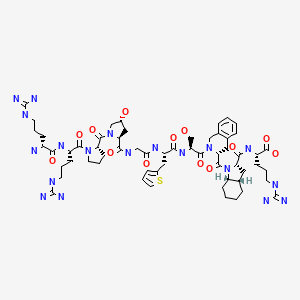Attribution Statement: LactMed is a registered trademark of the U.S. Department of Health and Human Services.
NCBI Bookshelf. A service of the National Library of Medicine, National Institutes of Health.
Drugs and Lactation Database (LactMed®) [Internet]. Bethesda (MD): National Institute of Child Health and Human Development; 2006-.
CASRN: 130308-48-4

Drug Levels and Effects
Summary of Use during Lactation
No information is available on the excretion of icatibant into breastmilk. Because icatibant is a protein molecule with a molecular weight of 1305 Da, the amount in milk is likely to be very low. It is also likely to be partially destroyed in the infant's gastrointestinal tract and absorption by the infant is probably minimal. One patient reportedly used the drug safely during breastfeeding. Waiting 6 hours after a dose before breastfeeding should minimize the amount of drug excreted into breastmilk.
Drug Levels
Maternal Levels. Relevant published information was not found as of the revision date.
Infant Levels. Relevant published information was not found as of the revision date.
Effects in Breastfed Infants
A woman with hereditary angioedema began using icatibant 30 mg subcutaneously as needed for hereditary angioedema attacks when her breastfed infant was 4 months of age and continued breastfeeding for 1 year while taking icatibant. Doses were injected at night before the infant’s longest sleep period and breastfeeding was not resumed until at least 6 hours after a dose. In cases of swelling of the face and neck and abdominal pain, icatibant was immediately self-administered, and formula was given instead of breastmilk. In her second pregnancy 2 years later, she used C1 esterase inhibitor until the infant was 1 month of age, when she resumed icatibant therapy. .[1]
Effects on Lactation and Breastmilk
Relevant published information was not found as of the revision date.
Alternate Drugs to Consider
References
- 1.
- Kondo Y, Yoshimura A, Azuma N. Successful management of hereditary angioedema with icatibant during the postpartum period. Journal of Cutaneous Immunology and Allergy. 2023;6:26–27. [CrossRef]
Substance Identification
Substance Name
Icatibant
CAS Registry Number
130308-48-4
Drug Class
Breast Feeding
Lactation
Milk, Human
Bradykinin Receptor Antagonists
Bradykinin B2 Receptor Antagonists
Disclaimer: Information presented in this database is not meant as a substitute for professional judgment. You should consult your healthcare provider for breastfeeding advice related to your particular situation. The U.S. government does not warrant or assume any liability or responsibility for the accuracy or completeness of the information on this Site.